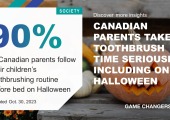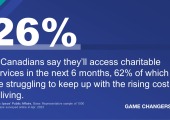A PROFILE OF CANADA'S NEXT DOOR MILLIONAIRE POLL
WHO THEY ARE, WHERE THEY ARE, AND ATTITUDES OF THE RICH, BUT NOT SO FAMOUS
A Profile of Canada's "Is That Your Final Answer?" Next Door Millionaire Poll
-- Who they are, Where they are, and Attitudes Of The Rich, but Not So Famous --
The Affluent Canadian Report is a syndicated study run by Toronto-based David Safran, Senior Vice President of the Financial Services Division of the Angus Reid Group.
A sample of 250 Canadians reported that their household has at least $1 million in financial assets, defined as the value of the household's investments/savings and excluding other assets such as a principal residence, other homes, businesses and the household possessions.
The survey was a self-completed questionnaire mailed to respondents between August and September 1999. This report excerpts findings about these 250 respondents, who represent approximately the top 2% of Canadian households by wealth.
Who Are Your Next Door Millionaires?
- The Millionaires of Canada have a very different demographic profile than that of the general Canadian population.
- They are older, on average (68% are 55+ years) and tend to be over-represented, within the survey, among two lifestage groups; first one being Households without Children (64%) and the second one being Retirees (40%).
- Millionaires hold higher education levels than the general adult population. Almost three-quarters (82%) have attended college/university (vs ~63% of general adult population). In fact, over one-third (38%) of the Millionaires who responded to the survey have post graduate university credentials - a rate much greater than the general adult population (~9%).
- In terms of employment status, Millionaires are over-represented in two categories: self-employed (35%), and retired (40%). In each case the representation among Millionaires is over twice the rate for the general adult population (10% and 19% respectively). However, Millionaires are also drawn from a diverse list of other types of occupations. These include: farmers (4%), artists (1%), consultants (4%), Physicians (5%) and service/retail (4%).
- However, business ownership is clearly an important source of wealth in Canada. Just over half (58%) of the Millionaires in our sample indicated that someone within the household entity owns a business.
Household Income
- While it is expected that the household income of Millionaires is much greater than the average Canadian family, not all of the Millionaires have six digit incomes (74% of respondents have six digit annual household incomes).
- Indeed, about one-quarter (26%) of the survey respondents reported household incomes below $100,000. A portion of this group surveyed are retired (40%) and thus are likely drawing their annual household income earnings from these financial assets.
Generations of Wealth
- When asked if they expect to inherit money, a majority (66%) say that they do not.
- Among the minority (31%) who do foresee receiving an inheritance, the expected amounts vary widely: from under $100,000 (by 36% of these Millionaires) to over a million dollars (by 10%).
Where Are Your Next Door Millionaires?
- Millionaires are over-represented in the provinces of Ontario (49% of Millionaires vs ~38% of the national population) and British Columbia (17% of Millionaires vs ~13% of the national population). They are under-represented in Quebec (14% of Millionaires vs ~25% of the national population) and the Atlantic Provinces (5% of Millionaires vs ~8% of the national population). Their representation in the Prairie Region is approximately the same as the general population.
Attitudes and Lifestyles of the Rich but "Not so Famous"
- Most Canadian Millionaires (89%) believe their success financially, and their "money allows [them] to help other people" where a smaller minority (36%) believe "money [to be] a way of measuring how well [they're] doing compared to everyone else".
- Almost half (48%) of the respondents to the survey agreed that their financial success, or money provides them with "a way of measuring [their] own performance to [themselves]" and less (16%) believe their money "to show other people that [they] are someone".
- For the majority (84%) of the Millionaires surveyed "money allows you to protect your family's future" and 88 percent believe it allows "you to do the things you want to do".
- Less than one quarter (21%) feel "money gives you power and control over other people".
Lifestyles of the Rich
- Perhaps a reflection of their age, the majority (81%) of Millionaires tend to believe that people are responsible for their own fortunes.
- Cliches about the lifestyles of the rich are supported through the findings of this survey. Both ends of the spectrum, the "jet-setters" who live for the moment and, the more sedate and traditionally wealthy Millionaires are represented in the survey sample.
- Two in five (41%) respondents agree that they are "enjoying today without worrying about tomorrow". However, half (50%) say that they consider themselves "more traditional than experimental". And one quarter (25%) agree that "things are changing too fast these days for them to feel comfortable".
- This dichotomy in lifestyles is also indicated by the type of leisure activities that Millionaires typically engage in. These activities cut across more sedate pursuits such as reading (25%) and gardening (19%). Though a portion are more active, either on the golf course (23%) or the jogging track (12%).
- Travel (24%), attendance at cultural activities (23%) and entertaining (12%) are also reported by the Millionaires as their leisure activities. A portion (10%) report that they are active in volunteer or charity work.
Millionaires On-Line
- Two-thirds (67%) of these Millionaires have access to the Internet, a slightly greater proportion than the general population (~56%).
For more information on this news release, please contact:
David SafranBack to Angus Reid Worldwide
Senior Vice President
Financial Services
Angus Reid Group
(416) 324-2900
More insights about Consumer Goods


![[WEBINAR] KEYS: Global Trends - The Uneasy Decade](/sites/default/files/styles/related_more_insights/public/ct/event/2025-09/thumbnail-templates_0.png?itok=Qh37M2xL)
![[WEBINAR] Canadian EV Adoption Trends in 2025](/sites/default/files/styles/related_more_insights/public/ct/event/2025-01/thumb.png?itok=RSGzZvMm)
![[WEBINAR] Sustainable Packaging: A Potential Avenue of Distinction](/sites/default/files/styles/related_more_insights/public/ct/event/2023-09/SustainablePackaging_WebR_feature%20copy.jpg?itok=X0DpNf_C)